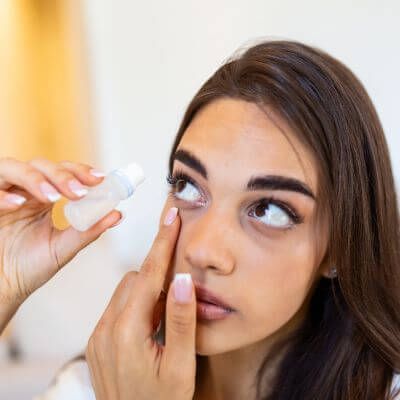What Your Eyes Might Be Telling You On Valentine’s Day
 You’ve heard it said that the eyes are the window to your soul, but it also turns out they can be telling us a lot about our physical health. So, take some time to gaze lovingly into your own eyes in the mirror this Valentine’s day, and see if they’re trying to tell you something about your health.
You’ve heard it said that the eyes are the window to your soul, but it also turns out they can be telling us a lot about our physical health. So, take some time to gaze lovingly into your own eyes in the mirror this Valentine’s day, and see if they’re trying to tell you something about your health.
Corneal Infection
If you wear contact lenses instead of glasses, watch out for white spots on your cornea, which is the clear dome covering the front of your eye. White spots can be a sign of a corneal infection. These must be treated aggressively so keep a close watch.
High Cholesterol
Usually if a white ring forms around your iris it’s just a sign of aging, but it may also be an indication of high cholesterol. As most of us know, high cholesterol increases your risk of a having a heart attack or stroke so it’s important to be aware of your cholesterol levels and lower them with diet or medication if necessary.
High Blood Pressure
Like high cholesterol, high blood pressure also increases your risk for having a heart attack or stroke. High blood pressure can also cause hypertensive retinopathy, which essentially means damaged blood vessels in your retina. You won’t be able to see retinal damage by looking in the mirror, but your ophthalmologist can detect it during a comprehensive eye exam, and it could save your life.
Retinal Tear or Detachment
Eye floaters are those tiny specks that sometimes move around in your field of vision, and they’re relatively common and usually harmless. However, don’t brush it off if you experience a sudden increase in eye floaters as they could be a sign of a retinal tear or detachment.
Diabetes
If you experience blurred vision, it most likely means you need glasses, but you should have your eyes checked to make sure there’s not another medical cause. Blurred vision can be caused by cataracts or macular degeneration of the eye, but it can also be a sign of a more serious illness like diabetes. In fact, a study by the American Association of Clinical Endocrinologists revealed that 73% of diabetic patients reported blurred vision. But even if you’re not experiencing blurred vision, your ophthalmologist may be able to detect diabetes based on irregularities in your retina.
Jaundice
If the whites of your eyes are more yellow than white, it could indicate jaundice, which is caused by too much bilirubin in your blood. If your liver isn’t filtering red blood cells properly, bilirubin builds up and causes your skin and eyes to take on a yellowish—or jaundice—cast. While rare, jaundice in adults is usually caused by gallstones blocking the bile ducts, alcohol-related liver disease, or hepatitis.
Eye Strain
If your eyes are dry or are tearing up, it could mean you need to take a break from looking at digital screens. If you spend much of your day staring at a computer screen, or most of the evening watching television, you may experience symptoms of digital eye strain such as a dry or gritty feeling, red or watery eyes, or eye fatigue. Following the “20-20-20” rule can help. Every 20 minutes, shift your gaze to look at an object at least 20 feet away, for at least 20 seconds. You can also lubricate your eyes with artificial tears.
This Valentine’s Day show your eyes some love by taking any unusual symptoms of eye disease seriously, and when it’s time to see a specialist schedule a consultation for a comprehensive eye examination with an ophthalmologist at Baptist Eye Surgeons .
With offices in Knoxville, TN and Morristown, TN, Baptist Eye Surgeons is an ophthalmological practice dedicated to providing quality eye care to patients whose needs range from routine comprehensive eye examinations to complex eye surgeries. To learn about our specialities and our doctors, visit our website . Call us at 865-579-3920 for more information, or visit us online to schedule an appointment .


MORRISTOWN
SEVIERVILLE
TENNESSEE VALLEY - LASER CENTER
TENNESSEE VALLEY - EYE CENTER



